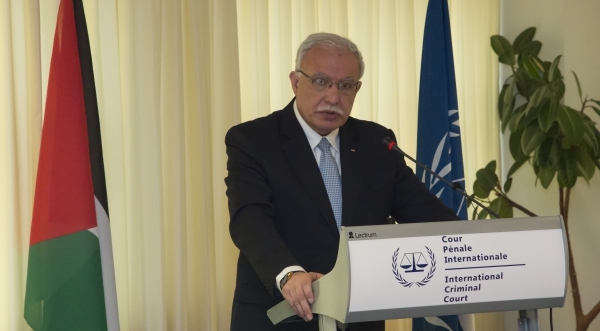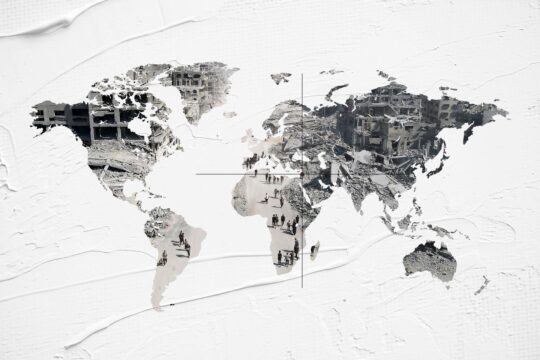A team from the International Criminal Court (ICC) is expected to visit Israel soon, at the request of Prosecutor Fatou Bensouda. This is a first in relations between Israel – which is not an ICC member State – and the Court. But the expectations of Israelis and Palestinians differ sharply with regard to these visitors, whose precise mandate and itinerary have not been specified.
After becoming a non-member State of the United Nations at the end of 2012, Palestine ratified the ICC Statutes and was admitted as the 123rd States Party (member) of the Court in April 2015. It was at Palestine’s request that the ICC opened a preliminary examination in early 2015 on crimes committed in Palestine. The Court produced a first report shortly afterwards, which said it had examined 66 communications it received on crimes dating back to June 2014. This period includes Israeli army search operations in the West Bank after the kidnapping of three Israeli adolescents and the Gaza war of summer 2014, but also Israeli settlement activities and destruction of Palestinian houses up to 2015. The 50-day Gaza war in summer 2014 left 2,100 Palestinians dead (at least half of whom were civilians) and 70 Israelis (mainly soldiers).
In its preliminary report, the ICC mentions suspected crimes committed by the Israeli army but also by Palestinian armed groups (firing rockets on the civilian population, attacks launched from civil buildings). The Court writes that it asked for cooperation from both the Palestinian and Israeli governments in its search for information. Palestine submitted the first documents in June 2015 and Israel announced a month later that it had decided to open a dialogue with the ICC.
New policy
So Israel has decided to adopt a new policy towards the ICC, consisting of exchange and openness. This is not because it has changed its mind about the Court’s legitimacy on this terrain, which it refutes, but because Israeli diplomats have decided to cooperate so as to better get their arguments heard in The Hague. "We have nothing to hide and we would be happy to show the court at The Hague how serious, professional and independent the Israeli legal system is," one of the Israeli officials told the Israeli daily Haaretz. "This is an additional opportunity to make clear that Israel believes there is no room for the intervention of the court at The Hague and that it has neither the authority nor the justification to handle the Palestinians' complaints."
Israel’s position is based on two arguments. The first is linked to the jurisdiction of the Court. According to the Rome State, the ICC was created to complement national judicial systems. It can only intervene if national courts are either unable or unwilling to do so. Israel has, however, opened its own investigations, notably on the Gaza war. Last week the Israeli army announced it was closing with no further action its investigations into the bombing of a UN school that left ten people dead during operations in 2014. Another investigation into airstrikes on civilian homes (tens of thousands of homes were partly or entirely destroyed during Operation Protective Edge in 2014) concluded that the strikes were justified because there was a Hamas “control centre” in their midst. So far, Israeli army investigations have led only to the prosecution of three soldiers for looting.
"Inadequate"
NGOs say internal investigations carried out by Israel are inadequate. "The Israeli justice system is not effective, there are no fair investigations,” says Shawan Jabarin, director of Palestinian human rights organization Al-Haq “The system doesn't meet the international standards."
“The problem with army investigations is that they never look at the operational decisions themselves, the rules of engagement,” says Yehuda Shaul, director of Israeli NGO Breaking the silence, which gathers testimonies from soldiers. “They look only at whether soldiers have broken these rules of engagement, without ever examining the operational command.” He adds that the reason so many children were killed during the 2014 war is largely because “artillery was used in densely populated areas whilst the precision of tank fire is a problem”.
Israel’s second argument against the ICC’s competence to intervene is that Palestine is not a State and therefore cannot file a complaint to the Court. The ICC has already rejected this argument, considering that Palestine’s passage from UN observer status to a non-member State allowed it to become a States Party to the Court.
It becomes clear on reading the ICC’s 7-page preliminary report that Israel’s new policy of collaboration is already showing some results, since the Israeli version of events is taken into consideration in the description of events since 2014. One example is the number of dead given for the Gaza war (half fighters and half civilians, says the report, whereas the Palestinians say 80% were civilians), or the number of rockets and mortars fired on Israel by armed Palestinian groups.
For Israel, the policy of defiant openness towards the Court results from a reflection on the negative consequences of its refusal to cooperate with a UN commission of inquiry in 2009. After another war against Hamas in Gaza (late 2008-early 2009), the UN Human Rights Council set up a commission of inquiry led by South African judge Richard Goldstone. In its report, the Goldstone commission accused both Israel and Hamas of war crimes and crimes against humanity. By refusing to meet the investigators – who nevertheless went to Gaza – Israel deprived itself of the possibility for Israeli citizens targeted by Hamas rockets to testify officially.






